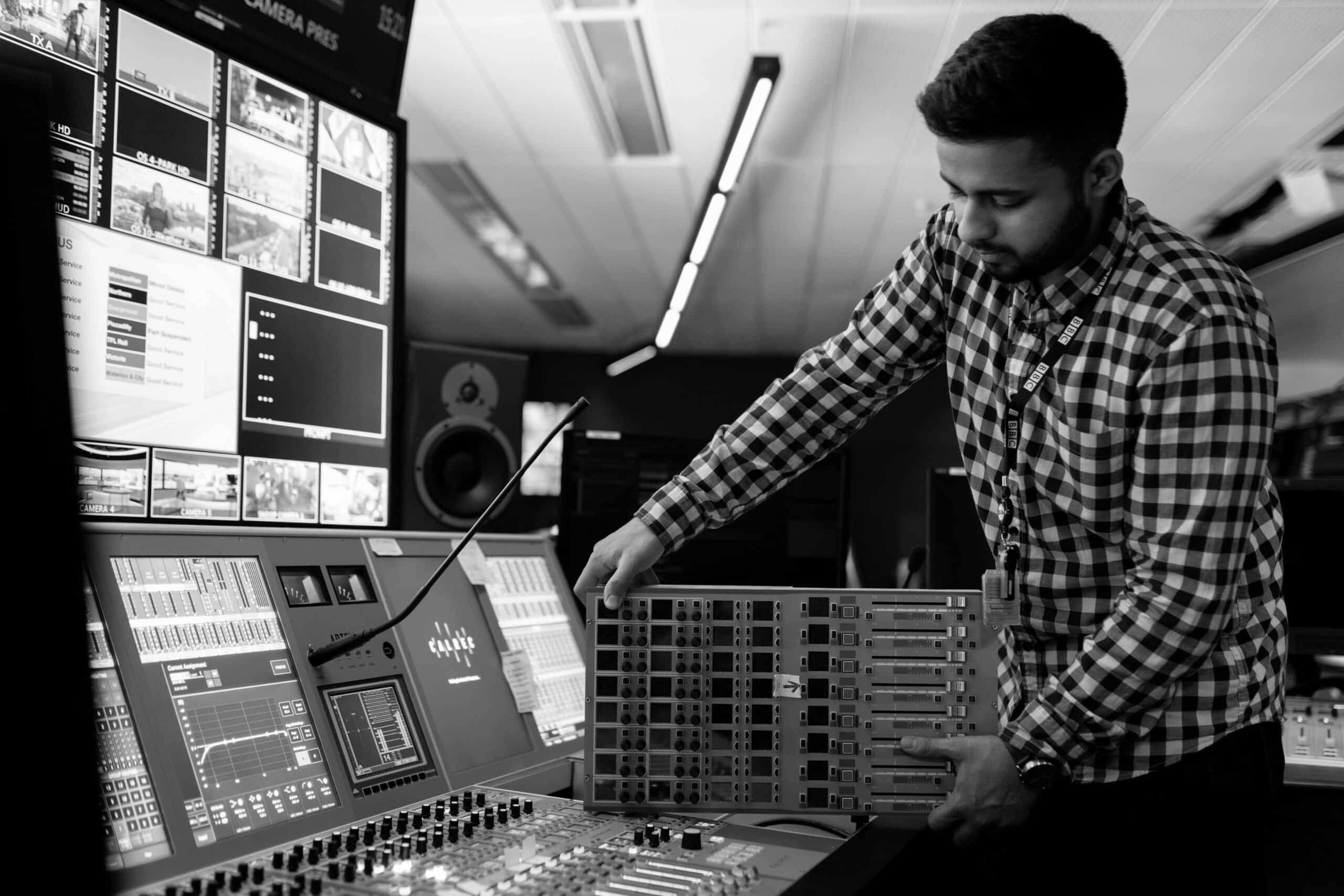Becoming a sound engineer is a popular option for those interested in pursuing a career in audio production. Most people often think that making waves in the music industry as a sound engineer is easy, and all you need is a digital audio workstation. Sorry to break it to you, but it’s a bit more complicated than that.
Producing audio that brings the visuals to life is indeed a challenging pursuit, but it’s not impossible. To become a sound engineer, you need to know how to record and edit audio or even create it from scratch on a digital audio workstation. In this article, we’ll dive deep into what a sound engineer does and the skills you need to become one.
So, let’s get started!
What Is Audio Production All About?
Audio production and sound engineering are two terms that are used synonymously in the music industry. Both audio production and sound engineering are all about creating mesmerizing sound for videos, TV commercials, movies, animated series, and more. If you want to pursue a career as a sound engineer, you need to know that the process for creating audios involves:
- Recording
- Editing
- Mixing
- Mastering
Now that you have a basic understanding of what audio producing and sound engineering are let’s look at what exactly a sound engineer does.
What Does A Sound Engineer Do In The Music Industry?
Before we dive any further, you must understand that the music industry is a diverse place, and a sound engineer is the center of attention. In the music industry, companies offer different services, such as sonic branding, to businesses, helping them make a lasting impact on audiences.
They also offer audio and music production services that bring life to different types of content. What’s important for you to know is that a sound engineer is involved in all of this. You see, sound engineering is quite a dynamic profession and can be divided into four branches that include:
-
- Research and development – if you work as a sound engineer on the research and development side, you will mainly focus on developing recording equipment and music technology that adds artistic value.
- Monitoring engineer – if you choose to go down this path, you’ll mainly be working with live performers as you assist them by improving their sound and audio.
- Systems engineer – if you choose to work as a systems engineer, you will be in charge of managing music equipment such as amplifiers, speakers, processors, and mixing consoles.
- Recording engineer – if you work as a recording engineer, you’ll be the one who handles all the recording equipment. You will use audio technology and sound mixing tools during a recording session to create sound effects and audio for different music genres.
By now, you’ve probably understood how dynamic sound engineering can be. It involves using signal processing to create an advanced recording, setting things up at a live performance, using creative ideas for sonic branding, and more. So, let’s dive into what you need to do to become a sound engineer.
What Skills Can Help You Become A Sound Engineer?
Before we get into the skills you need to become a sound engineer, you need to know that this professional works in different capacities. For instance, they might be involved in post-production editing, for which they’ll need to know different production techniques.
They might also be involved in electronic music production, for which they’ll need to know you mix music using pro tools. Beginning to see the full picture? That said, let’s look at some of the skills you must have to become a sound engineer. They include:
Digital Audio Workstation Management
When you work as a sound engineer in the music industry, a lot of your time will be used up working with digital audio workstations. So, it’s needless to say that you need to master it. You must know that a digital audio workstation is one of the most important pieces of equipment in a studio environment.
You can use it to manage recordings, compose music, and edit and finalize tracks for publishing. In addition to using the digital audio workstation, you’ll also need to know how to make sure that one is properly set up and configured. So, you’ll need to do some cable checks every now and then.
Mixing and Mastering
These are two of the most essential music production skills that you need to have if you want to work as a sound engineer with music producers. Mixing and mastering is a key step in audio post-production and involves the use of a mixing console and other audio software. When it comes to learning audio production, you need to know that recording studio mixing techniques involve:
- Planning – you need to determine which sounds will play on the right and left audio channels.
- Compression – this technique can help you adjust the load and quiet aspects of a track when you produce music.
- Noise reduction – this is essential to the audio production process, and here, you’ll focus on removing unwanted noise from a track.
- Filtering – you need to use sound production equipment like a mixing console to remove noise that is above certain predefined audio signals or frequencies.
Mastering is one of the most important technical aspects of audio engineering and is essential when it comes to creating sound effects for a final audio file. This skill is handy when working with pro tools for beat-making and adding instrumental breaks. You must be familiar with audio editing so you can convert an unmixed recording into a mesmerizing track.
Soft Skills
Believe it or not, soft skills do have an essential role to play in your journey of becoming an audio engineer. These skills aren’t directly related to audio production work like dynamics processing but can be necessary when you’re working in a studio production environment. Some of the soft skills include:
- Communication and critical listening – this refers to your ability to work with other sound engineers and film production team members throughout the creative process.
- Problem-solving – when you work with a music producer or a movie production team, things can go wrong. This refers to your ability to come up with solutions on the spot.
- Time management – throughout the music production process, you’ll have deadlines for all the songs you need to finish, so learning how to manage your time is essential.
Hardware Management
If you want to be successful as an audio engineer, hardware management is another skill you need to master. You must have sound knowledge of all the instruments and equipment used in a recording session. This might include a recording console, digital audio workstations, and instruments like a guitar or a piano.
If you plan on doing an audio production degree or course, you’ll likely learn about the hardware audio engineers use during sound recording and audio production. This information is essential as it’ll help you connect one piece of hardware to the other and will allow you to work with different tools in recording studios.
Equalizing
If you’re looking to be an audio engineer, you need to know that an equalizer will be your best friend. An equalizer is what audio producers use to perfect sound effects and sound designs. As an audio engineer, you must learn how you can increase or decrease audio signals using an equalizer.
However, you must remember that an equalizer is not one particular type of equipment. Anything that increases or decreases audio signals can serve the purpose of equalizing sound. Common examples of this include guitar pedals, amps, and recording consoles. Equalizing can help you create mesmerizing sound recordings for a music business.
Music Theory
You might not be actively composing music when you work as a sound engineer, but some audio producers will require that you know music theory. You don’t need to be the Elvis Presley of all the instruments, but you should be able to make your way around them. Learning theory can also help you create your own music and start your own.
The truth is most music is made using audio technology, so if you master the theory, you can even create electronic music from scratch. Applying music theory will give your audio recording a more rhythmic structure and can help you use chords accurately if needed. This can boost your chances of working with a reputable music producer.
Key Takeaways
A sound engineer has an essential part to play in audio production work. These professionals are in charge of maintaining recording equipment, assisting audio producers, and even mixing and mastering tracks. To be an audio engineer, you need to have a firm grip on music theory, studio equipment, and mixing and mastering to make waves in the audio production industry.
If you’re looking for audio production, music composition, or sonic branding that wins over the audience, contact us today!
Frequently Asked Questions (FAQs)
What does a sound engineer do in music production?
A sound engineer wears multiple hats. They can be seen managing equipment, working with producers, and mixing tracks.
Does a music producer need a sound engineer?
Yes, having a sound engineer is essential during the music production process since this person can help manage equipment and create captivating audio.
Should sound engineers be able to play instruments?
Being able to play an instrument might not be necessary, but it can definitely help you become an audio engineer.












